‘People should be terrified’: What the Supreme Court could come for after Roe v Wade
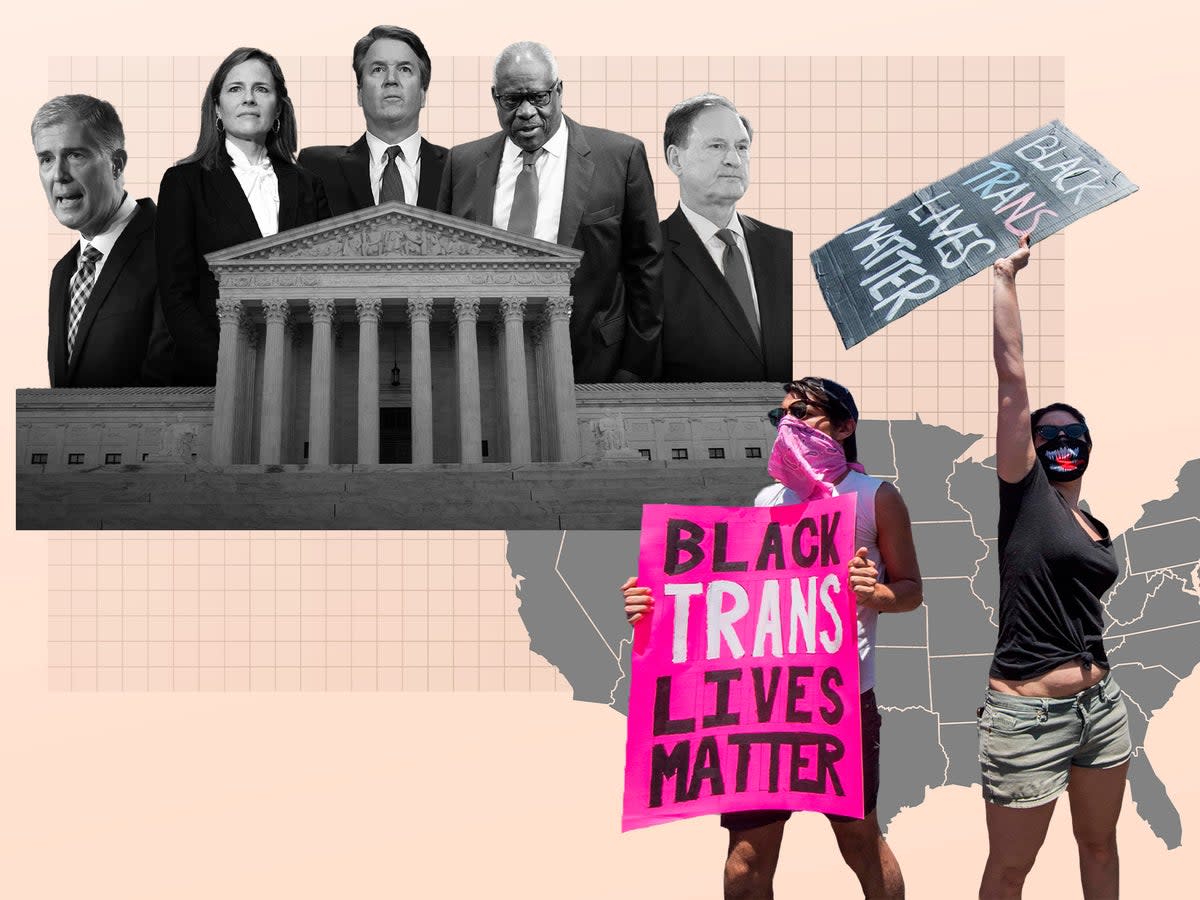
- Oops!Something went wrong.Please try again later.
In January 2006, Charles Fried was asked to testify before the US Senate about whether his former colleague Judge Samuel Alito would overturn the right to abortion if he were appointed to the Supreme Court.
As solicitor general of the United States back in 1989, Fried had argued on behalf of President Ronald Reagan that Roe v Wade, the landmark 1973 Supreme Court case that enshrined Americans' right to terminate their pregnancies, was decided in error and should be overturned.
Since then, however, new case law had put the right to abortion on much firmer footing, causing Fried to change his stance. He told the senators that Alito as a judge had stayed "in the mainstream", albeit "toward the right bank of the mainstream", and that, while he could be wrong, he believed the new Supreme Court justice would respect precedent and let Roe stand.
"Well, my face is red on that one," Fried recalls now to The Independent.
Last month, Justice Alito caused shockwaves when his draft ruling overturning Roe v Wade was leaked to Politico. Giving the majority's opinion on a Mississippi law that had sought to restrict abortion, in a case known as Dobbs v Jackson, he wrote that "Roe was egregiously wrong from the start" and that the right to abortion was not "deeply rooted" in American history.
Such a ruling would reverse nearly 50 years of precedent and allow Republican state governments to effectively outlaw abortion across a broad swath of the US, curtailing the rights of tens of millions of women. Yet legal scholars and civil rights pioneers say Alito's arguments could also allow the Supreme Court to strike down major LGBT+ rights such as the right to gay marriage, the right of gay spouses to government benefits and recognition, and even the right to gay sex.
"I'm terrified and people should be terrified," says Jim Obergefell, whose lawsuit against the state of Ohio led to the Supreme Court ruling that gay marriage was protected by the US Constitution.
"This is a signal to people who are opposed to marriage equality, who are opposed to LGBT+ equality, who are opposed to progress, giving them actual words that they can use in a lawsuit to challenge something. And it's a signal to judges in state and federal courts that if cases come before you using this argument, the Supreme Court might be on your side."

A conservative ruling with radical ambitions
When the Supreme Court voted 7-2 in favour of "Jane Roe" in 1973, they did so on the basis of one of the most disputed clauses in the US Constitution, added in the aftermath of the Civil War.
The 14th Amendment, which was only ratified by rebel states under military occupation and the threat of being excluded from Congress, declares that "nor shall any state deprive any person of life, liberty, or property, without due process of law".
In the 20th century, the Supreme Court began interpreting this clause as giving Americans "unenumerated" rights not explicitly mentioned in the Constitution, including the right to privacy and to be free from government intrusion into fundamental choices about one's body – such as abortion.
Roe v Wade was controversial at the time, with even some liberal scholars accusing the court of faulty reasoning. But when the court revisited abortion rights in 1992, with the case of Planned Parenthood v Casey, it upheld Roe partly by citing a legal principle known as stare decisis (Latin for "stand by decisions"), which asks judges to resist overturning past rulings unless they were seriously wrong.
Alito's draft opinion in Dobbs v Jackson rubbishes all this. Citing previous rulings that unenumerated rights based on the "due process" clause must be "deeply rooted in this nation's history and tradition" and "implicit in the concept of ordered liberty", he argues that there is "zero" support in American law for a universal right to abortion and that Roe "was on a collision course with the Constitution from the day it was decided".
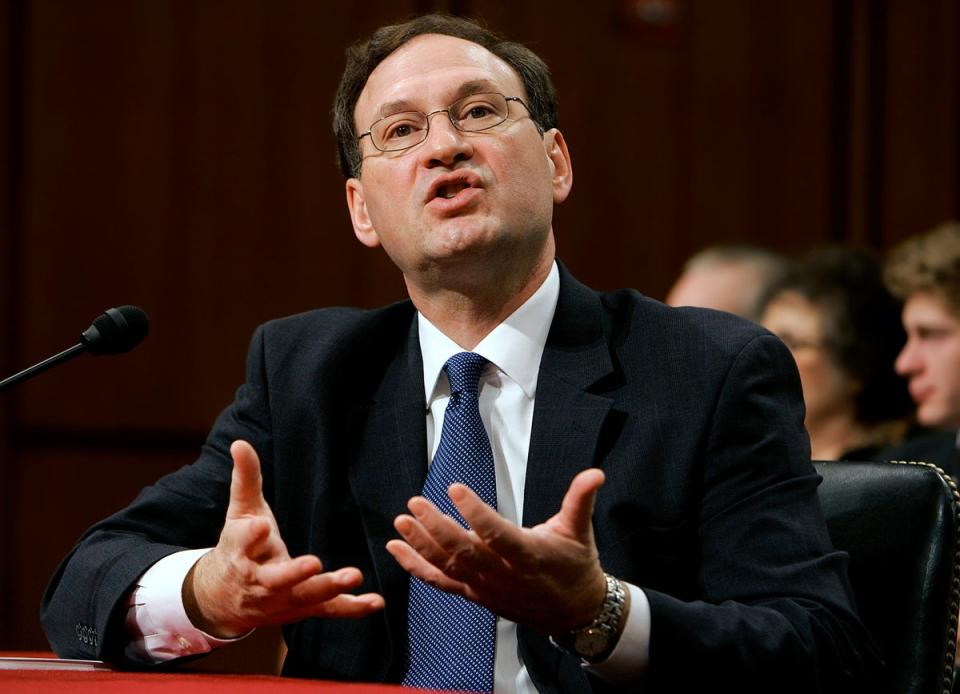
Then Alito goes further, listing a series of other cases decided partly by the due process clause including Skinner v Oklahoma in 1942 (which held that Americans cannot be sterilised without their consent), Griswold v Connecticut in 1965 (which recognised the right to contraception), and Loving v Virginia in 1967 (which outlawed racial restrictions on marriage).
He also lists Lawrence v Texas in 2003 (which struck down anti-sodomy laws), United States v Windsor in 2013 (which forced the federal government to treat same-sex marriages just like straight marriages), and Obergefell v Hodges in 2015 (which established the right to gay marriage).
Alito concludes that none of these rights "have any claim to being deeply rooted in history". In other words, they could be as unconstitutional as Roe and Casey in the eyes of Alito – and any other justice that concurs with his opinion.
Indeed, the opinion's existence suggests that four other justices have already voted to overturn Roe, reflecting the court's powerful new conservative majority. Six of the nine justices were appointed by Republican presidents, and are current or former members of the conservative Federalist Society; three were appointed by Donald Trump.
It is a historic triumph for the Republican Party, which blockaded the nomination of Merrick Garland to a vacant Supreme Court seat during the last nine months of Barack Obama's presidency, only to ram through a conservative pick by President Trump in only 38 days just before the 2020 election.
At risk: gay marriage, gay sex, and transgender medical care
To Fried, now a professor at Harvad Law School, Alito's arguments reminded him of a quip from his opponent when he argued against Roe on behalf of President Reagan back in 1989.
Laying out his case, Fried told the court that he was not opposing the whole fabric of unenumerated rights, such as the right to contraception; he just wanted to pull one thread. His opponent responded that if you pull a thread on a woolen sweater, the sleeve falls off.
"What Alito's draft does is, of course, it causes the sleeve to fall off," says Fried. "The Roe opinion was very vulnerable, but Casey was on very solid ground constitutionally, because it talks about the dignity of the woman and the importance of being able to choose her own life plan... the gay sex case, the gay marriage case, those are all on that kind of argument... it would wreak havoc."
He adds that the majority opinions in Casey, Lawrence, and Obergefell were all written or co-written by the now retired Justice Anthony Kennedy, who was appointed by Reagan in 1988, thus linking their legal arguments together.
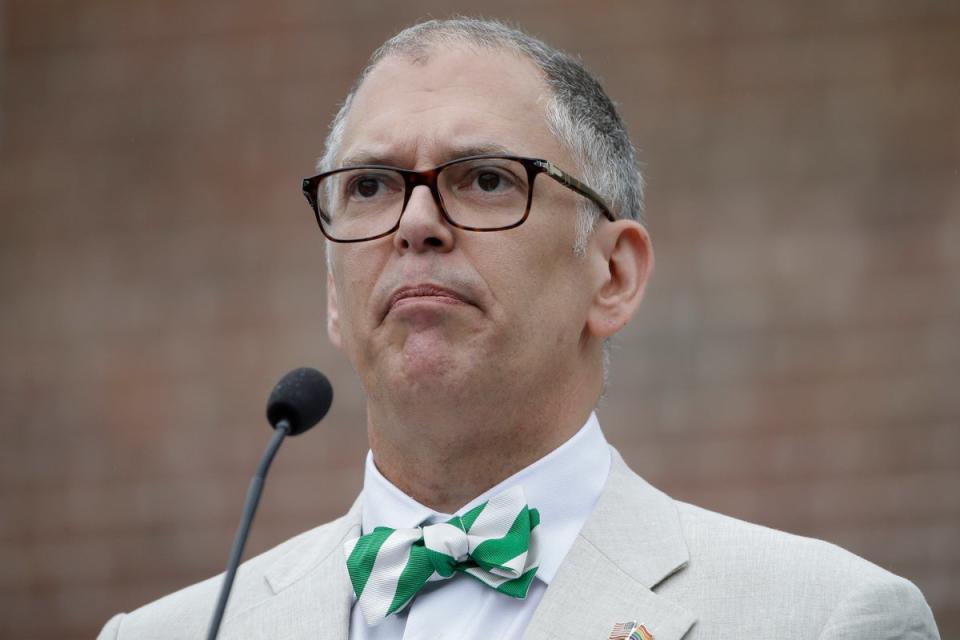
Jim Obergefell himself first heard about Alito's leaked draft while he was reading in bed, and immediately felt "sick to [his] stomach". As well as a blow to women's rights, he saw its wide-ranging language as a "clear call" to conservative activists and Republican state governments to mount legal challenges to LGBT+ rights, and an arsenal of arguments that they can use to do so.
He points out that with the right to marry come numerous other rights: inheriting your spouse's property without paying tax on it, visiting your spouse when they are in hospital, being listed alongside your spouse on your children's birth certificate, accessing tax benefits for married couples, being allowed access to a family cemetery plot, and having the right to family leave from your job.
"Justice Alito’s reasoning puts all of those rights in jeopardy," agrees Erwin Chemerinsky, a veteran constitutional scholar and the dean of Berkely School of Law, who testified against Alito's nomination by accusing him of a "dangerous" deference to executive power.
"Protecting gay and lesbian rights does not meet [Alito's] criteria... the current court would decide those cases differently and cares little about following precedent."
A new Gallup poll shows that support for gay marriage has risen to a new high of 71 per cent.
Paul M Smith, a lawyer who led the successful challenge against sodomy laws in Lawrence v Texas and is now a senior vice president at the Campaign Legal Center, likewise tells The Independent that Alito's reasoning would apply to that case. And Roberta Kaplan, who shot down the federal boycott of gay marriage in Windsor, told Grid News that gay couples should "get married right away – if you’re ready, of course".
The ruling could also imperil progressive challenges against the wave of anti-transgender bills currently sweeping red states, which seek to ban gender-affirming medical treatments for trans people under 18 or bar them from school sports. Those too involve the fundamental right to determine what happens to a person's body.
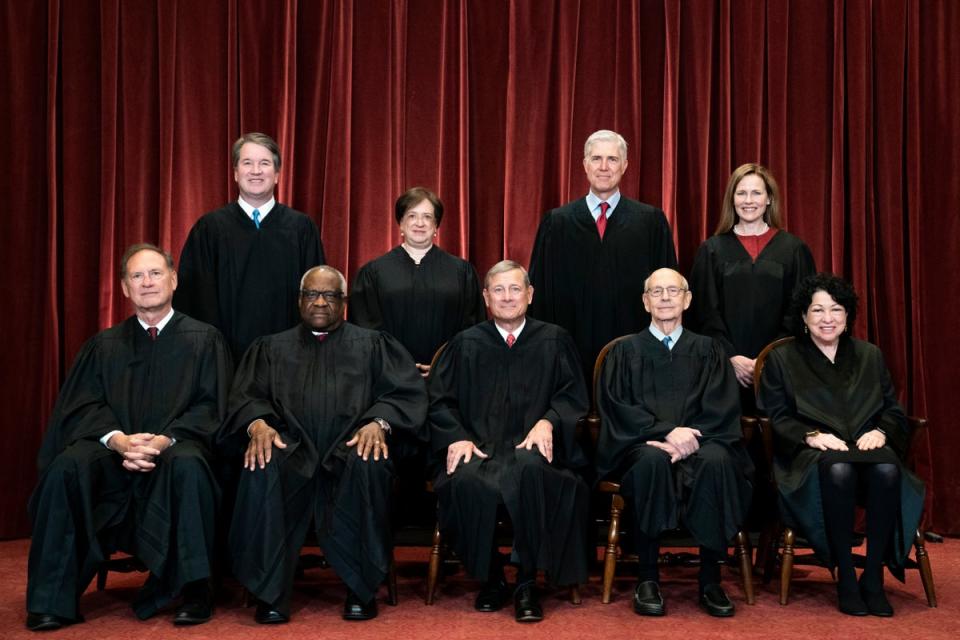
When a federal judge last month blocked Alabama's "Vulnerable Child Compassion and Protection Act", which bars puberty-blockers and hormone therapy for trans minors, he did so partly on the basis of the due process clause of the 14th Amendment. "Parent Plaintiffs have a fundamental right to direct the medical care of of their children”.
In fact, Fried fears the impact could go beyond LGBT+ rights. He cites 1977's Moore v City of East Cleveland, which struck down a city ordinance forbidding a grandmother to live with her son – and disproportionately affecting black families – as violating an unenumerated "right to family integrity". That was based on the same due process clause as Roe.
Meanwhile, reproductive rights activists are concerned that Alito's logic may be used to overturn the right to contraception, which would also affect queer women, transgender men, and some non-binary people. Chemerinsky suspects that the new hyper-conservative court will reverse that right for methods that take effect after conception.
Experts don’t buy Alito’s reassurances
The leaked draft is keen to stress that these other rights are not at risk. "To ensure that our decision is not misunderstood or mischaracterised, we emphasise that our decision concerns the constitutional right to abortion and no other right," says Alito. "Nothing in this opinion should be understood to cast doubt on precedents that do not concern abortion."
At another point, Alito claims: "None of the other decisions cited by Roe and Casey involved the critical moral question [of destroying a foetus] posed by abortion. They are therefore inapposite. They do not support the right to obtain an abortion, and by the same token, our conclusion that the Constitution does not confer such a right does not undermine them in any way."
Yet none of the experts interviewed by The Independent felt this was worth much. "It's hard to put too much store into that, because the rest of his reasoning is inconsistent with recognising the liberty of same sex couples to get married," says Smith.
"I think this is a hollow reassurance," says Chemerinsky.
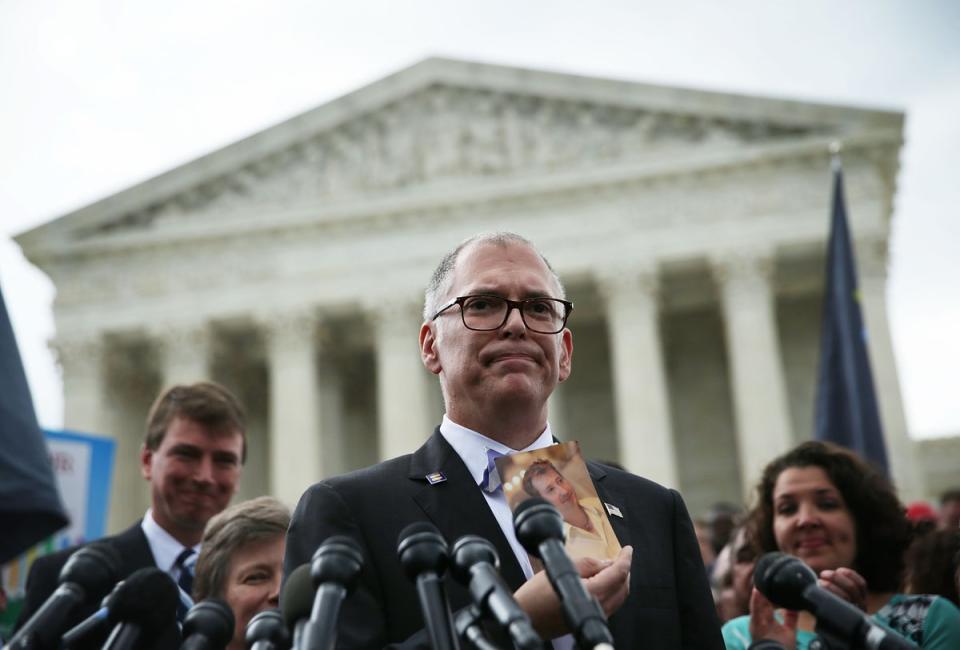
Obergefell points to the previous statements of Trump-appointed justices Brett Kavanaugh and Neil Gorsuch, who reportedly voted against Roe v Wade despite suggesting in their confirmation hearings that they accepted it as precedent. "This leaked decision clearly proves they weren't being completely honest or truthful," says Obergefell, "so why should anyone believe a line that says this doesn't apply to marriage equality?"
Fried, meanwhile, recalls Justice William Brennan's habit of welcoming new clerks by slowly holding up five fingers one by one – indicating that the most important principle on the Supreme Court is getting five out of nine votes. Asked about Alito's disclaimer, Fried simply holds up five fingers. "It doesn't make sense, and I don't think he means it," Fried says. "The entailments [of Alito's logic] are very clear.”
Indeed, Alito dissented from the majority opinion in Obergefell v Hodges and in Bostock v Clayton County, a case from 2020 that declared it illegal for employers to discriminate against queer and transgender people. In a highly political speech to the Federalist Society in 2020 he even claimed Obergefell had damaged freedom of speech for conservatives.
Chemerinsky added: "Conservatives have wanted to overrule Roe v Wade for decades and they now have the votes to do so. It is entirely about that; there are five conservative judges who disagree with Roe and want to overrule it."
Signs that red states will challenge gay marriage
The process may already be underway. Last October, a Republican state representative in Texas asked the Lone Star State's attorney general Ken Paxton if Obergefell v Hodges "requires private citizens to recognise homosexual marriages when the law of Texas continues to define marriage exclusively as the union of one man and one woman".
The previous month, a lawyer who helped craft Texas' restrictive new anti-abortion law filed an amicus brief in the Supreme Court's case revisiting Roe v Wade, denouncing the "court-invented rights to homosexual behaviour and same-sex marriage".
“These ‘rights,’ like the right to abortion from Roe, are judicial concoctions, and there is no other source of law that can be invoked to salvage their existence," wrote Jonathan Mitchell and his co-author Adam Mortara. "Lawrence and Obergefell, while far less hazardous to human life, are as lawless as Roe."
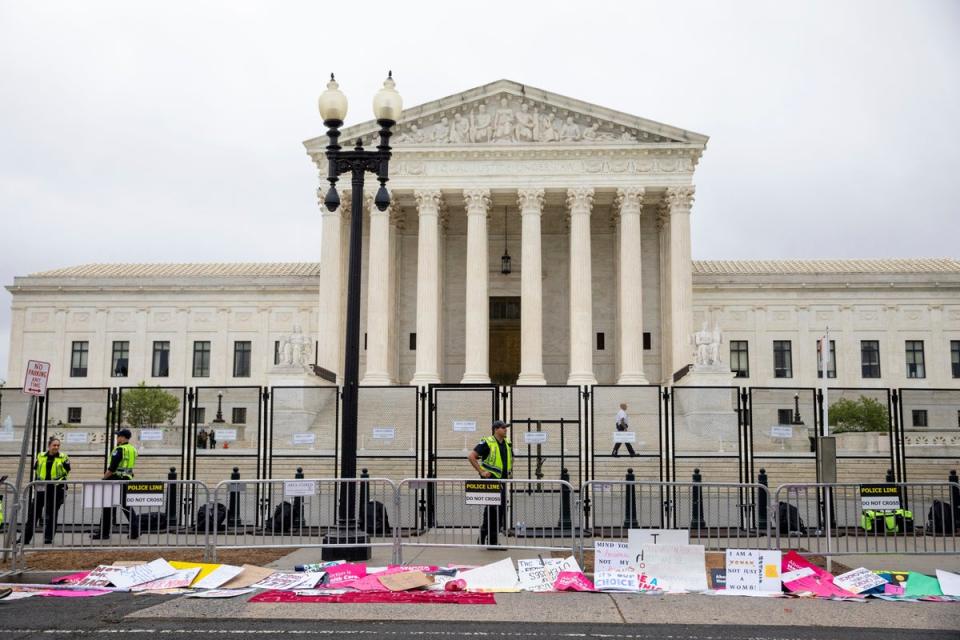
Numerous states, including Texas, still technically ban gay marriage, even if their bans cannot be enorced. Texas is also one of 14 states that never repealed their anti-sodomy laws, despite them being ruled illegal in Lawrence.
Texas Republicans have already seized on the opportunity of a conservative Supreme Court by passing the abortion law, which was bound to be challenged. The court then refused to block that law, issuing an unusual unsigned opinion arguing that opponents had not made their case properly.
“The court’s order is stunning,” wrote liberal Justice Sonia Sotomayor in a dissent. "Presented with an application to enjoin a flagrantly unconstitutional law engineered to prohibit women from exercising their constitutional rights and evade judicial scrutiny, a majority of justices have opted to bury their heads in the sand... the impact is catastrophic."
Brynn Tannehill, a think tank analyst and author of the book American Fascism, has claimed that Texas is planning a similar thrust against gay marriage. "My sources tell me that Texas is absolutely going to mount a challenge to Obergefell as soon as the decision in Dobbs v Jackson drops," she told The New Republic last month. "And they have a good chance of winning it, given what Alito, [Clarence] Thomas and Kavanaugh have written about LGBT issues earlier, particularly in Alito's dissents."
Paul Smith tells The Independent he finds that idea "perfectly credible". The Texas attorney general's office did not respond to a request for comment.
Why the Supreme Court may yet stay its hand
Nevertheless, Smith cautions that there are also signs the Supreme Court will defend LGBT+ rights. "If there are five justices who want to overturn Obergefell, and Lawrence, they can, and this will provide them an excuse for doing so," he says. "If they don't want to do that, they're certainly not going to be force by the logic of the decision to do that. The impact is not going to be some kind of hydraulic pressure on the Court."
According to Smith, most LGBT+ rights could also be justified purely on the basis of the fourteenth amendment's "equal protection" clause, which forbids any state to "deny to any person within its jurisdiction the equal protection of the laws".
Previous case law has firmly established that "equal protection" forbids discrimination on the basis of sex, and in Bostock v Clayton County, Gorsuch, Kavanagh and Chief Justice John Roberts joined their liberal colleagues to rule that this included discrimination against gay or transgender people. The judge who blocked Alabama's trans children bill cited this principle too.
Moreover, Smith says rights based on the equal protection clause are not subject to the same "deeply rooted" test as rights based on the due process clause. In 1954, the court ruled in Brown v Board of Education that racial segregation was unconstitutional – despite there being few things more deeply rooted in American history than the oppression of Black people.
If the Supreme Court does reverse LGBT+ rights, the blowback could be severe. "I don't think this is an experiment we've ever seen before, where the court, instead of adding rights to protect discrete an insular minorities, takes them away," says Smith. "It makes the court look terrible. They look political, they look mean."
He argues that while Alito and Thomas are "firmly, emotionally opposed" to LGBT+ rights, other justices such as Gorsuch and Roberts might recognise "the enormous blow to the perceived legitimacy of the court" that would come from "telling the country that there's no gay rights anymore".
"The Dobbs case is going to be pretty major in itself," adds Smith. "The two are about equal in their degree of making the American people mistrustful of the court, and the court doesn't like to do that. Having done it once, they may very well hesitate to do it again."
Obergefell has little hope for the court, let alone the deadlocked US Congress, and believes abortion and LGBT+ rights activists must now take their fight to state legislatures. He himself is running for the House of Representatives in his home state of Ohio, albeit in a strongly red district.
"All you have to do is look at surveys and polling: people support marriage equality," he says. "Americans support a woman's right to control her medical decisions. It's up to state legislatures to stop being controlled by extremists [and] to enact laws that will protect those rights that we enjoy, that we have relied on, at least at the state level."
Chemerinsky is pessimistic. "It is the most conservative court since the 1930s," he says. "Clarence Thomas is the oldest of the conservative justices and he is just 73 years old. The six conservatives range in age from 49-73, so all could remain on the court another decade or more...
“There is no check on Supreme Court justices’ ability to go back on [Alito's] assurances. They can do what they want."
The Independent is the official publishing partner of Pride in London 2022 and a proud sponsor of NYC Pride.

